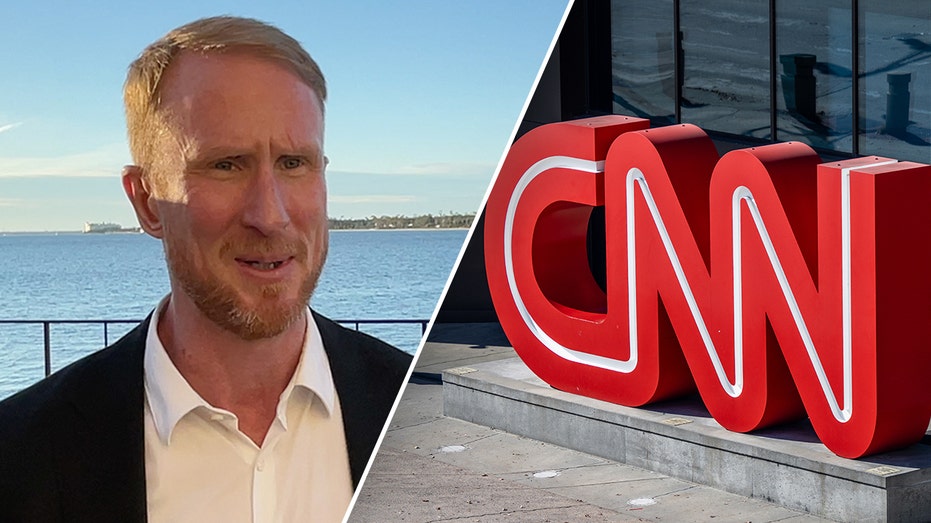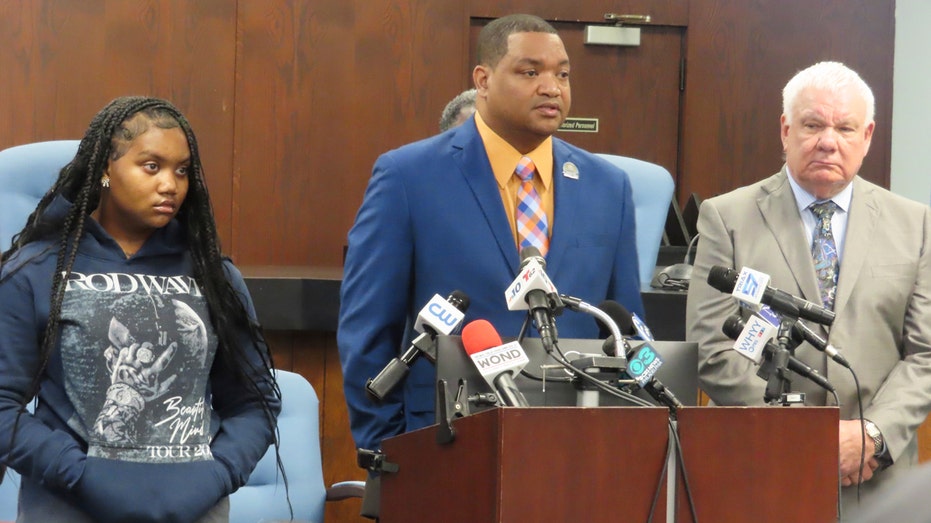Kamala Harris and Gretchen Whitmer Could Reclaim America’s Imagination
For the first time in American history, a former president was convicted of felony crimes in May, and a month later the Supreme Court decided presidents have immunity from prosecution for crimes committed in office. Then, two weeks ago, that same former president survived an assassination attempt. If this were a tragicomic foreign indie film, it might be titled Two Months in the United States. Unprecedented is the default word used to describe this moment. But a better one might be unimaginable.The past several years have stretched and worn the limits of our imaginations. Most Americans never thought they’d witness the overturning of Roe v. Wade, or the U.S Capitol swarmed by election-denying insurrectionists, or campus protests nationwide over Israel’s invasion of Gaza that echoed the 1960s. And now, to this list that’s already broken the button on our imagination, we add this: President Joe Biden has dropped out of the presidential race and endorsed Vice President Kamala Harris. The question immediately turns to who runs alongside her. In a country where finding the right political pairing is as much about balancing out identities as qualifications (unless it’s two white men), people may not immediately warm to the thought of pairing Harris with Michigan Governor Gretchen Whitmer, or any other female politician. There’s mixed reporting around whether Whitmer is even interested or up for the task, but inevitable questions like, “Is the country ready for two women to lead it?” reveal how, while our imagination has grown tremendously in some ways (not all of them good), in others it remains incredibly small. Even before Biden’s announcement on Sunday, the idea of a Harris-Whitmer ticket had made its way into public discourse with surprising velocity, a sign that a political calculus rooted in questions of electability and national readiness may be changing. The biggest question people are asking about Harris and Whitmer, or whoever winds up on the ticket, is whether they can win in November—a reasonable and necessary question. But there is a great swathe of time after November. Elections aren’t endings; they’re beginnings. A two-woman ticket would demonstrate that Democrats believe there is an after-election world that they will be relevant in shaping. The slogan practically writes itself: a historic team in a time when history is being made in all the wrong ways. Within seconds of the bullet grazing his ear during his campaign rally, Donald Trump pumped his first in the air. An American flag rippled in the breeze behind him, blood streaked across his cheek. This is an indelible image for his supporters to hook their hopes on. Do the Democrats have an equivalent of this? An all-female ticket could be a step toward one. The Dobbs ruling has altered the political landscape, and women are driving this shift. Harris-Whitmer would offer an indisputable counterimage to the one Trump has successfully spun alongside his newly minted running mate, Senator J.D. Vance. That choice sent the message that Trump was doubling down—on macho politics, yes, but more specifically on abortion bans. But backlash doesn’t belong to the right; Democrats have equal access to it should they choose. In some ways, the turmoil over Biden’s candidacy was part of a broader reckoning within the Democratic establishment, a fight over the future of a party that, since 2016, has been largely defined by stopping Trump. But perhaps Democrats have paid too much attention to Trump’s agenda rather than tending more fervently to their own. Perhaps they’ve allowed their imagination to be seized by their political foils. How do you reclaim a stolen imagination? It starts with understanding what feeds it. Anyone who’s ever had anxiety will know that the way you combat an anxious thought is not by chasing it around like a headless chicken. It’s by introducing a new one to counteract it. I don’t mean to make a two-woman ticket sound revelatory or radical when, frankly, we should all be embarrassed that we’re yet to have a female president. When the discussion around identity and viability in our politics dies, I will not be at that funeral. But to many Democratic voters, the bar for this election is already on the floor. This is one way it might be raised so it’s at least in eyesight.America in 2024 feels like a place where truly anything is possible, for better or worse. At the end of this year, we may have a president-elect who’s suggested he’ll be a dictator on day one in office. Or we may have a president who’s a Black woman, the first, serving alongside another woman—or a man. Or we may have someone else entirely. Who’s to say? This may be the true power and purpose of imagination. It prepares us for anything.

For the first time in American history, a former president was convicted of
felony crimes in May, and a month later the Supreme Court decided presidents
have immunity from
prosecution for crimes committed in office. Then, two weeks ago, that same
former president survived an assassination attempt. If
this were a tragicomic foreign indie film, it might be titled Two Months in the United States. Unprecedented is the default word used to describe this
moment. But a better one might be unimaginable.
The past several years have stretched and worn the limits of our imaginations. Most Americans never thought they’d witness the overturning of Roe v. Wade, or the U.S Capitol swarmed by election-denying insurrectionists, or campus protests nationwide over Israel’s invasion of Gaza that echoed the 1960s. And now, to this list that’s already broken the button on our imagination, we add this: President Joe Biden has dropped out of the presidential race and endorsed Vice President Kamala Harris.
The question immediately turns to who runs alongside her. In a country where finding the right political pairing is as much about balancing out identities as qualifications (unless it’s two white men), people may not immediately warm to the thought of pairing Harris with Michigan Governor Gretchen Whitmer, or any other female politician. There’s mixed reporting around whether Whitmer is even interested or up for the task, but inevitable questions like, “Is the country ready for two women to lead it?” reveal how, while our imagination has grown tremendously in some ways (not all of them good), in others it remains incredibly small.
Even before Biden’s announcement on Sunday, the idea of a Harris-Whitmer ticket had made its way into public discourse with surprising velocity, a sign that a political calculus rooted in questions of electability and national readiness may be changing. The biggest question people are asking about Harris and Whitmer, or whoever winds up on the ticket, is whether they can win in November—a reasonable and necessary question. But there is a great swathe of time after November. Elections aren’t endings; they’re beginnings. A two-woman ticket would demonstrate that Democrats believe there is an after-election world that they will be relevant in shaping. The slogan practically writes itself: a historic team in a time when history is being made in all the wrong ways.
Within seconds of the bullet grazing his ear during his campaign rally, Donald Trump pumped his first in the air. An American flag rippled in the breeze behind him, blood streaked across his cheek. This is an indelible image for his supporters to hook their hopes on. Do the Democrats have an equivalent of this? An all-female ticket could be a step toward one. The Dobbs ruling has altered the political landscape, and women are driving this shift. Harris-Whitmer would offer an indisputable counterimage to the one Trump has successfully spun alongside his newly minted running mate, Senator J.D. Vance. That choice sent the message that Trump was doubling down—on macho politics, yes, but more specifically on abortion bans. But backlash doesn’t belong to the right; Democrats have equal access to it should they choose.
In some ways, the turmoil over Biden’s candidacy was part of a broader reckoning within the Democratic establishment, a fight over the future of a party that, since 2016, has been largely defined by stopping Trump. But perhaps Democrats have paid too much attention to Trump’s agenda rather than tending more fervently to their own. Perhaps they’ve allowed their imagination to be seized by their political foils. How do you reclaim a stolen imagination? It starts with understanding what feeds it. Anyone who’s ever had anxiety will know that the way you combat an anxious thought is not by chasing it around like a headless chicken. It’s by introducing a new one to counteract it.
I don’t mean to make a two-woman ticket sound revelatory or radical when, frankly, we should all be embarrassed that we’re yet to have a female president. When the discussion around identity and viability in our politics dies, I will not be at that funeral. But to many Democratic voters, the bar for this election is already on the floor. This is one way it might be raised so it’s at least in eyesight.
America in 2024 feels like a place where truly anything is possible, for better or worse. At the end of this year, we may have a president-elect who’s suggested he’ll be a dictator on day one in office. Or we may have a president who’s a Black woman, the first, serving alongside another woman—or a man. Or we may have someone else entirely. Who’s to say? This may be the true power and purpose of imagination. It prepares us for anything.



